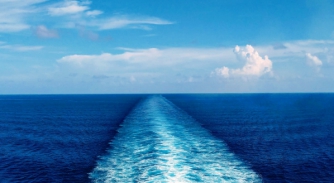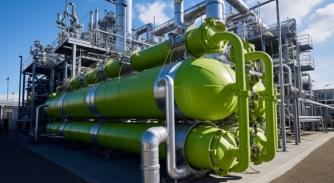More sustainability jargon busting
Here, we explain more sustainability terms to equip you with an understanding of this fast-paced area…

Following our previous explanation of net zero, carbon neutrality and sustainability, Sustainability Editor Megan Hickling delves into some commonly misunderstood terms within the industry.
Fossil Free
The term ‘fossil-free’ means that for a product or service, within a reasonably defined scope of its operation or lifecycle, no fossil fuels are used. As fossil fuels are also a raw material for plastic products, eliminating fossil-fuel-based plastics, such as plastic water bottles, can contribute to achieving a fossil-free status.
An example of a fossil-free fuel is hydrogenated vegetable oil (HVO), as it is derived from biomass. However, it would only be considered truly fossil-free if the energy used to produce the fuel is not sourced from fossil fuels.
The ambitious Project Zero from Dykstra Naval Architects, Vripack Yacht Design and Vitters Shipyard aims to be a fossil-free yacht using ambitious zero-emission technologies such as hydro-generation (the creation of energy through sailing), solar energy and electrification, as well as fundamental design changes to reduce energy demand while providing a superyacht experience.
Zero Emissions
‘Zero emissions’ implies that, typically, a propulsion system does not emit any substances that pollute or harm the environment while operating. Slightly more ambiguous than its name implies, a truly zero-emissions project is harder to conceive and exists only in concept form.
Hydrogen fuel cells are used commonly in many ‘zero emission’ concept yachts. They achieve zero emissions as the system in use only emits heat and water during the process. In contrast, other alternative fuels and propulsion systems, like methanol and ammonia, are not zero-emission and involve efforts to reduce their emissions and production impacts.
There are a few concept designs out there claiming to be ‘zero emission’, such as the Domus trimaran, which uses a combination of hydrogen fuel cells, hydro generation and solar energy, along with a battery-storage system.
Carbon Capture
Carbon capture technology mitigates carbon dioxide (CO2) emissions from significant point sources, such as power plants, refineries and other industrial facilities. It also means the removal of existing CO2 from the atmosphere. This captured carbon is then stored for use in various products and processes, such as carbonated drinks or methanol fuel, or longer-term storage solutions, such as mineral or geological-based solutions. It is a complex solution that's often overly simplified as an easy solution to continue polluting ways.
The superyacht industry is involved directly with the mitigation of emissions from source, via the use of scrubbers to reduce carbon emissions into the atmosphere, as well as indirectly through carbon offsetting, funding larger projects involving direct air CO2 removal.
Decarbonisation
This term refers to efforts to reduce the release of carbon, primarily CO2, into the atmosphere, with the overarching objective of creating a decarbonised or low-carbon economy. These efforts mainly involve separating our economy from products and processes that produce carbon gases. ‘Decarbonising the fleet’, a common term in our industry, is a part of these wider actions and commonly means the advancement of electrification and the development of more renewable and alternative sustainable power sources, such as hydrogen and ammonia fuel cells and ammonia.
However, similar to the colour coding of methanol, the level of decarbonisation is dependent on the production method and energy sources at this stage to make these alternative fuels –for example, using renewable energy sources rather than fossil-fuel-generated energy to produce hydrogen. In a decarbonised economy, the carbon footprint inherent in products and services due to the sources of energy needed in early life-cycle stages will be much reduced compared to a more carbon-based economy.
Overall, fossil-free and some zero-emission alternatives can contribute to the decarbonisation journey. However, the effectiveness of these efforts depends on various factors, including the scope considered for zero emissions and fossil-free. It is essential to explore the entire production process, from the power's origin to raw material extraction methods. Carbon capture offers a way to achieve decarbonisation after carbon emissions have occurred, and this complex topic will be further expanded on in a forthcoming article.
Many alternatives with these characteristics are available to the industry to reduce harmful emissions. Navigating these terms is essential. As regulations catch up with scientific imperatives, the industry may be held accountable for misusing a jargon-sounding word in its marketing copy.
NEW: Sign up for SuperyachtNewsweek!
Get the latest weekly news, in-depth reports, intelligence, and strategic insights, delivered directly from The Superyacht Group's editors and market analysts.
Stay at the forefront of the superyacht industry with SuperyachtNewsweek
Click here to become part of The Superyacht Group community, and join us in our mission to make this industry accessible to all, and prosperous for the long-term. We are offering access to the superyacht industry’s most comprehensive and longstanding archive of business-critical information, as well as a comprehensive, real-time superyacht fleet database, for just £10 per month, because we are One Industry with One Mission. Sign up here.
Related news

The missing superyacht sustainability report
Many industries have overarching sustainability reports, providing insights and accountability. Where is the superyacht equivalent performance assessment?
Opinion

Methanol's colour coding conundrum
Methanol is fast becoming a popular, environmentally friendly alternative fuel, but it is important to understand that not all methanol is created equal
Technology

Navigating sustainability jargon
With companies presenting many 'greener' alternatives, distinguishing genuine solutions from greenwashing can be as tricky as spotting the wood from the trees
Crew

Turbulence ahead
As the landmark ‘greenwashing’ case against the Dutch air carrier proceeds to full trial, the superyacht industry should take note
Opinion
Related news
The missing superyacht sustainability report
1 year ago
Methanol's colour coding conundrum
1 year ago
Navigating sustainability jargon
1 year ago
Turbulence ahead
2 years ago
NEW: Sign up for
SuperyachtNewsweek!
Get the latest weekly news, in-depth reports, intelligence, and strategic insights, delivered directly from The Superyacht Group's editors and market analysts.
Stay at the forefront of the superyacht industry with SuperyachtNewsweek



